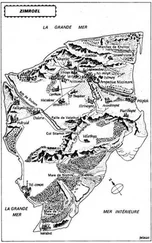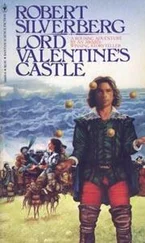Robert Silverberg - Lord of Darkness
Здесь есть возможность читать онлайн «Robert Silverberg - Lord of Darkness» весь текст электронной книги совершенно бесплатно (целиком полную версию без сокращений). В некоторых случаях можно слушать аудио, скачать через торрент в формате fb2 и присутствует краткое содержание. Год выпуска: 1983, ISBN: 1983, Издательство: Arbor House, Жанр: Исторические приключения, на английском языке. Описание произведения, (предисловие) а так же отзывы посетителей доступны на портале библиотеки ЛибКат.
- Название:Lord of Darkness
- Автор:
- Издательство:Arbor House
- Жанр:
- Год:1983
- ISBN:0-87795-443-7
- Рейтинг книги:5 / 5. Голосов: 1
-
Избранное:Добавить в избранное
- Отзывы:
-
Ваша оценка:
- 100
- 1
- 2
- 3
- 4
- 5
Lord of Darkness: краткое содержание, описание и аннотация
Предлагаем к чтению аннотацию, описание, краткое содержание или предисловие (зависит от того, что написал сам автор книги «Lord of Darkness»). Если вы не нашли необходимую информацию о книге — напишите в комментариях, мы постараемся отыскать её.
Lord of Darkness — читать онлайн бесплатно полную книгу (весь текст) целиком
Ниже представлен текст книги, разбитый по страницам. Система сохранения места последней прочитанной страницы, позволяет с удобством читать онлайн бесплатно книгу «Lord of Darkness», без необходимости каждый раз заново искать на чём Вы остановились. Поставьте закладку, и сможете в любой момент перейти на страницу, на которой закончили чтение.
Интервал:
Закладка:
We lunched on the meat of the whale, which was still unspoiled though not much to my liking, and talked long and earnestly of our strategies, and afterward we commenced a search for wood with which to build our craft. Whether we would have fulfilled this project is a question I can never answer, but I tell you that the planning of it gave us hope, without which life would have been cruel indeed for us. An ocean separated me from my Anne Katherine. A tropic sun burned my skin. Buzzing things hovered in clouds, and bit and stung. Nightmare creatures dwelled in the rivers and could march upon us in any moment. Yet I did not despair, for what use has despair? And my strength became the strength of the others. I talked of schemes that even I knew were sheer madness, and made them sound plausible. The one I most clearly remember was a notion of journeying up the whole coast of this southern America, and from isle to isle in the West Indies, and northward aye to Virginia, where Walter Ralegh had founded a colony on Roanoke Island. In my mind that distance was not so great, although in fact it is nigh as far as sailing to Africa, and we would be in enemy waters all the way. But the idea, rash or not, sustained us for a few days. And in the end the rashness of it mattered not at all, since we never had a chance to put it in practice, owing to the return of the Indians to the island.
They came upon us as stealthy as cats. A canoe laden with them landed on the west side of our island, and they made their way through the woods and emerged out of the mists of dawn, surrounding us in a ring with drawn bows. Their bows were long and black and their arrows long also, with heads of sharpened cane, and they would have skewered us wonderfully had we given any resistance. But to resist was folly. These Indians were naked, and some were painted in quarters with their paints, others by halves, and others all over, like a tapestry. They all had their lips pierced; some had bones in them, though many had not. All were shaven to above the ears; likewise their eyelids and eyelashes were shaven. All their foreheads were painted with black paint from temple to temple, so that it seemed they were wearing a ribbon round them two inches wide. Their chieftain spoke to us in jabber, or so it seemed, “Umma thumma hoola hay,” and words like that, which he repeated five or seven times.
Torner said to me, “You have the knack of languages, Andy. Tell him we mean no harm, that we are enemies of the Portugals, and hope to be friends of his folk.”
“Shall I say it in umma and thumma?” I asked.
The chief spoke again. I tried to imitate it, though learning a language at the point of an arrow is wondrously ticklish. We might have spoken nonsense back and forth at each other all morning, until they lost patience and slew us, but then the chief said a few words in unmistakable Portuguese, and the words were, “You come with us.”
To my comrades I said, “These are tame Indians, that belong to the Portugals, I think. We will not be slain, but I think will be made slaves.”
“Better to be slain,” muttered Richard Jennings.
“Nay,” I said, “dead men never escape, but lie dead forever. Slavery is less permanent. And these Indians do but save us the trouble of getting ourselves to Santos.”
So the Indians took us over to the mainland in their canoe, a boat that they had made of a whole tree. When we came to the shore of that place we saw a town of some hundreds of people, very silent, and out of the silence we heard the ringing of a bell. “It must be Sunday,” said Torner, and we all spat, for we knew by that bell that the Portugals were at their Mass, and at that same instant the friar was holding up the bread of sacrament before the people for them to worship it. So it was, for the Indians marched us right to the church, and would have thrust us clear inside. But a Portugal in leather breeches came out and forbade it, saying, “You may not enter. You are not Christians.”
I translated that for the others and high color came to Richard Fuller’s face and he cried, “I would not enter that building even to shit in it!” and such. The Portugal, I think, understood some English, or else he knew the essence of Fuller’s words from his tone, for his eyes grew very cold and he took from his neck a heavy crucifix of silver, and put it in front of Richard Fuller’s mouth and commanded him to kiss it. I knew what Fuller was apt to do, and I began to say, “Have care,” but it was too late, for Fuller had already gathered in his mouth a gob of spittle and let it fly over the image of Jesus and the Portugal’s hand. Whereupon the Portugal took his silver idol and struck it across Richard Fuller’s mouth to split his lips and break his teeth and send blood into his beard, and then thrust its end into Richard Fuller’s gut so hard that the man retched and puked; and then he waved his hand and the Indians took Fuller away toward some trees behind the town. We never saw him again. I could not then believe that one European would have another one slain in this strange land for mere disrespect for a Popish idol, except perhaps a Spaniard might, but I thought higher of the Portugals. So I believed they only had Fuller kept in solitary confinement to punish him for impiety. But since those days I have seen much of the world and its cruelties, and I now know that blood is shed for even more trivial reasons, sometimes for no reasons at all, by Portugals and Spaniards and French and Dutch and everyone else, and even an Englishman is capable of murdering a man for a fancied or real slight to his religion, though perhaps he would hold court on him first. Did not King Henry have a man’s head struck off for eating meat on Fridays, and others for denying certain tenets of the Creed, and did not Queen Mary burn good Protestants like roasting-oxen for speaking out against the Pope? I think this is not the way of Jesus, but it is the way of princes and men, and not uncommon.
The rest of us they made captive in the cellar of a storehouse for a few days, chaining our wrists and ankles with manacles, and letting us eat by giving us bowls of the mashed root called manioc, that we had to lick with our tongues like dogs. The governor of that place came to us and spoke with me, asking why we were intruding in the territory of the Portugals, were we spies or only pirates, to which I made reply that we were settlers going to the Virginia colony, blown far off course and shipwrecked in the Brazils. “So you will be,” he said, “shipwrecked a long while in the Brazils.”
I think he wanted no part of us, for very shortly a sloop arrived at Santos and took us off to a larger town that the Portugals had built to the north, in the mouth of the river called the Rio de Janeiro. On this journey we passed the Ilha Grande, where Cocke had left the Dolphin, and saw no trace of it. In the Rio de Janeiro we remained four months. Here there were two things of importance, a Jesuit college and a great sugar-mill on an isle called the Island of the Governor. Jennings and the other man were sent to be servants at the College of Jesus, I suppose swabbing the floors so the friars would not soil their robes when they knelt, and Torner and I were turned out to the sugar-mill. I know not which pair of us fared worse, those that slaved for the Popish scholars or those that broke their backs to feed that mill: I dare say Torner and I suffered greater pain of the body, and the other two a larger pain of the soul. But we had no chance to compare notes, because after we were separated I never encountered the other two afterward, and for all I know they are still there, maybe Jesuits themselves by this time, old and bowed and fluent in Latin and skilled at singing the Mass, God pity them.
For me it was an education of a different kind. They had me on a bark going day and night up and down for sugar canes and wood for the mill. I had neither meat nor clothes, but as many blows as a galley-slave would receive, and Torner as well. We talked daily of escape, but there was little chance of that, the mill being on an island and the surrounding waters said to be full of man-eating fishes. We were desperate enough before long to risk testing if that were true, except that the case seemed hopeless, there being nowhere safe to flee. The Portugals had enslaved certain tribes of Indians and made them do their bidding, but a little way beyond the town the Indians were wild, and they too were man-eaters. Cannibal fishes by sea and cannibal men by land: prudence argued that we stay awhile where we were, since we were only being beaten, which is less barbarous a fate than being eaten.
Читать дальшеИнтервал:
Закладка:
Похожие книги на «Lord of Darkness»
Представляем Вашему вниманию похожие книги на «Lord of Darkness» списком для выбора. Мы отобрали схожую по названию и смыслу литературу в надежде предоставить читателям больше вариантов отыскать новые, интересные, ещё непрочитанные произведения.
Обсуждение, отзывы о книге «Lord of Darkness» и просто собственные мнения читателей. Оставьте ваши комментарии, напишите, что Вы думаете о произведении, его смысле или главных героях. Укажите что конкретно понравилось, а что нет, и почему Вы так считаете.












